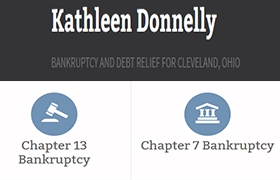Bedford Bankruptcy & Debt Lawyer, Ohio
Sponsored Law Firm
-
 x
x

Click For More Info:
-
Law Office of Kathleen Donnelly
526 Superior Ave #1030 Cleveland, OH 44114» view mapChapter 7, Chapter 13, Free Evaluations Need Debt Relief? Contact Me Today
There is hope for debt relief. At the Cleveland, Ohio, law office of Kathleen Donnelly, we help people like you to escape from under mountains of debt.
800-413-4100
Samuel Jay Mamich
Divorce & Family Law, Criminal, Business, Bankruptcy & Debt
Status: In Good Standing *Status is reviewed annually. For latest information visit here Licensed: 51 Years
Brian James Melling
Corporate, Bankruptcy, Personal Injury, Workers' Compensation
Status: In Good Standing *Status is reviewed annually. For latest information visit here Licensed: 50 Years
Shaun Edward Whitehead
Family Law, Commercial Bankruptcy, Personal Injury
Status: In Good Standing *Status is reviewed annually. For latest information visit here Licensed: 9 Years
Michael James Creager
Business, Bankruptcy & Debt
Status: In Good Standing *Status is reviewed annually. For latest information visit here Licensed: 46 Years
Patrick Gene O'Hara
Litigation, Government, Corporate, Collection
Status: In Good Standing *Status is reviewed annually. For latest information visit here Licensed: 15 Years
Randi Lynn Nine
Bankruptcy & Debt
Status: In Good Standing *Status is reviewed annually. For latest information visit here Licensed: 16 Years
Jeffrey M. Yelsky
Litigation, Employment, Criminal, Bankruptcy
Status: In Good Standing *Status is reviewed annually. For latest information visit here Licensed: 33 Years
Daniel Ian Bergrin
Real Estate, International, Estate Planning, Commercial Bankruptcy
Status: In Good Standing *Status is reviewed annually. For latest information visit here Licensed: 12 Years
Leah M. Caplan
Other, Lawsuit & Dispute, Business, Bankruptcy & Debt
Status: In Good Standing *Status is reviewed annually. For latest information visit here Licensed: 38 Years
Robert Anthony Taormina
General Practice
Status: In Good Standing *Status is reviewed annually. For latest information visit here Licensed: 35 Years

 Kathleen Donnelly Cleveland, Ohio
Kathleen Donnelly Cleveland, Ohio About UsKathleen Donnelly
About UsKathleen Donnelly Contact UsCall or Email Right Now
Contact UsCall or Email Right Now